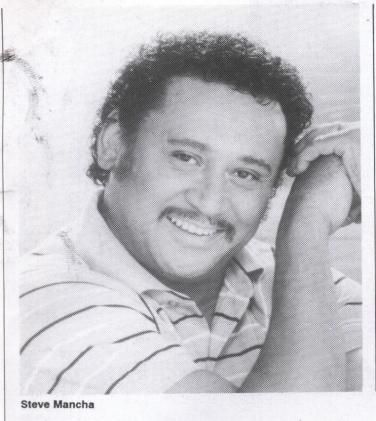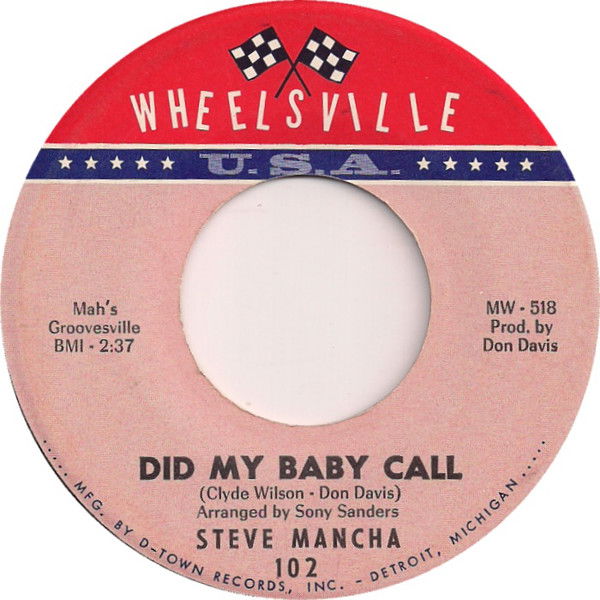STEVE MANCHA

Steve Mancha was a Detroit-based performer whose biggest hits were all with vocal groups.
He was born Clyde Wilson in Walhall, South Carolina, on Christmas Day 1943—or 1945, depending on which source you believe. When he was five years old, his family relocated to Detroit. By 1960, Wilson was singing around town and befriended Fortune Records recording artist Melvin Davis. He teamed up with Wilburt Jackson as the duo Two Friends. They recorded “Just Too Much to Hope For” on Harvey Fuqua’s short-lived HPC label, but it did nothing. (Several years later, Tammi Terrell recorded the song too.)
Fuqua, formerly of the Moonglows (“Sincerely,” “Ten Commandments of Love”), then started the Tri-Phi and Harvey labels with his wife, Gwen Gordy. When the husband-and-wife team decided to join Gwen’s brother, Berry, at Motown, the Two Friends were included in the deal. Wilson and Jackson co-wrote some songs that didn’t do much, like the Monitors’ “Number One in Your Heart,” but Motown either never recorded the duo or never released anything on them.
Feeling neglected, Wilson left Motown in 1965 to work with songwriter-producer Don Davis, who felt that “Clyde Wilson” was too common-sounding a name. When he suggested the singer change it, Wilson became Steve Mancha. His first single under that name, “Did My Baby Call,” came out on the Detroit-based Wheelsville label in 1965. It did well in some local markets but did not make the national charts.
After three additional Wheelsville releases that did little to nothing, Mancha recorded with fellow Detroiters Edwin Starr and J.J. Barnes as the Holidays. Their 1966 recording of Starr’s “I’ll Love Forever,” on Golden World Records, reached #7 on the Rhythm & Blues chart and #63 pop. Later that year, Mancha’s solo release, “I Don’t Want to Lose You,” made #34 R&B. In 1967, he hit #34 R&B again with “Don’t Make Me a Story Teller.” In 1968, Don Davis moved Mancha to his Groove City label, but “Hate Yourself in the Morning” and “Sweet Baby” were both commercial flops.
In 1969, Mancha was offered a golden opportunity by the writing and production trio of Eddie Holland, Lamont Dozier, and Brian Holland. They had left Motown over royalty disputes in 1967 and started the Hot Wax, Invictus and Music Merchant family of labels. H-D-H put Mancha together with Joe Stubbs (brother of the Four Tops’ Levi Stubbs) and Eddie Holiday as 100 Proof Aged in Soul. Their debut release, “Too Many Cooks (Spoil the Soup),” made the R&B survey in 1969 but did not chart pop. However, their next single, “Somebody’s Been Sleeping,” hit #6 R&B and #8 pop in the late summer of 1970.
In 1971, H-D-H formed a new group with Mancha on lead vocals. The 8th Day included his old friend, Melvin Davis, and had two major hits: “She’s Not Just Another Woman” and “You’ve Got to Crawl (Before You Walk).” Meanwhile, Don Davis leased Mancha’s old recordings to Stax Records, which resulted in the Rare Stamps album that also included tracks by J.J. Barnes.
When H-D-H- relocated to Los Angeles and Steve Mancha didn’t, his career was essentially over. He switched to gospel music and, in 1998, hooked up with British producer Ian Levine to record “It’s All Over the Grapevine,” which became a Northern Soul hit in the UK. In 2000, Mancha did a concert in London with Edwin Starr and J.J. Barnes. He died in Detroit on January 8, 2011.
Charted singles:
“I’ll Love You Forever” (The Holidays, 1966) R&B #7, Pop #63
“I Don’t Want to Lose You” (1966) R&B #34
“Don’t Make Me a Story Teller” (1967) R&B #34
“Too Many Cooks (Spoil the Soup)” (100 Proof Aged In Soul, 1969) R&B #24, Pop #94
“Somebody’s Been Sleeping” (100 Proof Aged In Soul, 1970) R&B #6, Pop #8
“One Man’s Leftovers (Is Another Man’s Feast)” (100 Proof Aged In Soul, 1971) R&B #37, Pop #96
“90 Day Freeze (On Her Love)” (100 Proof Aged In Soul, 1971) R&B #34
“She’s Not Just Another Woman” (The 8th Day, 1971) R&B #3, Pop #11
“You’ve Got to Crawl (Before You Walk)” (The 8th Day, 1971) R&B #3 Pop #28
“If I Could See the Light (The 8th Day, 1972) R&B #27, Pop #79
“Everything Good Is Bad” (100 Proof Aged In Soul, 1972) R&B #15, Pop #45
“Eeny-Meeny-Miney-Mo (Three’s a Crowd)” (The 8th Day, 1972) R&B #29

